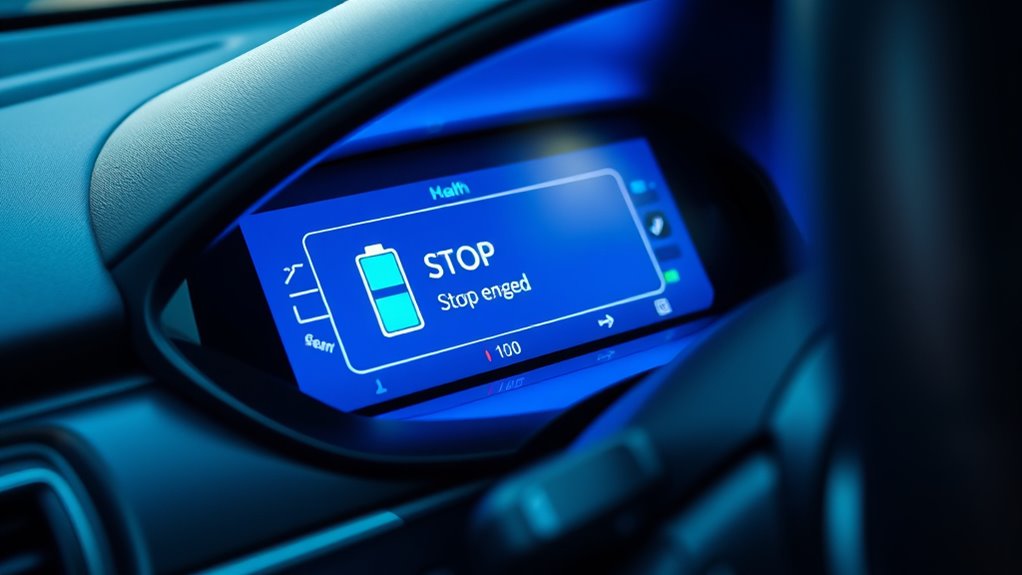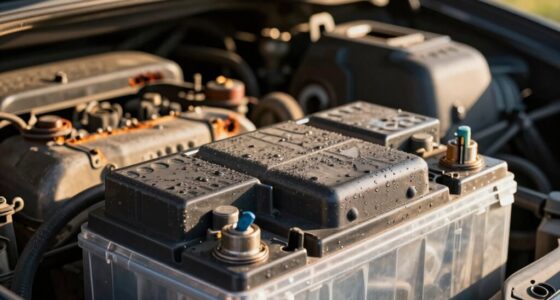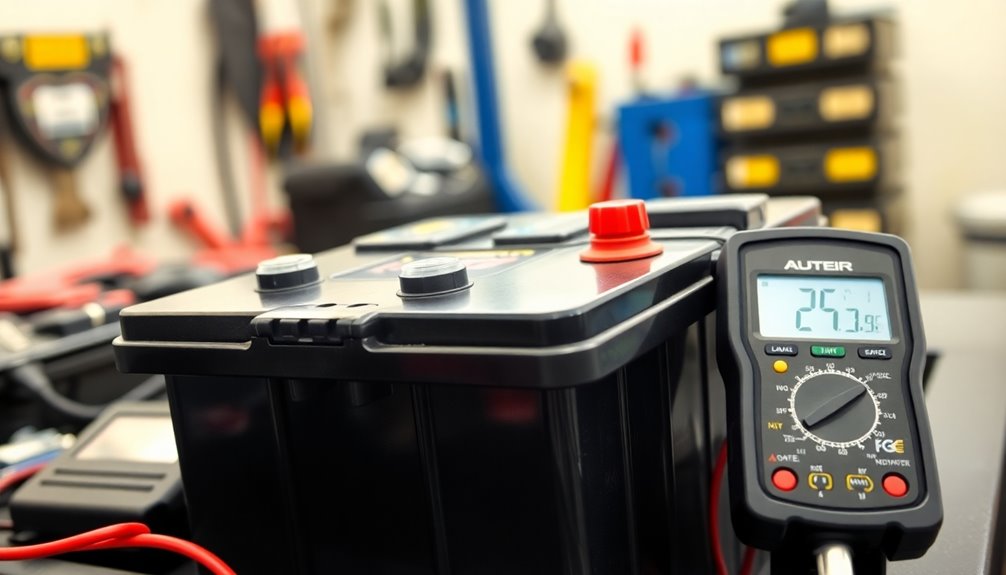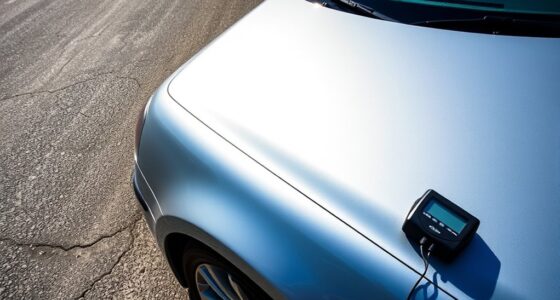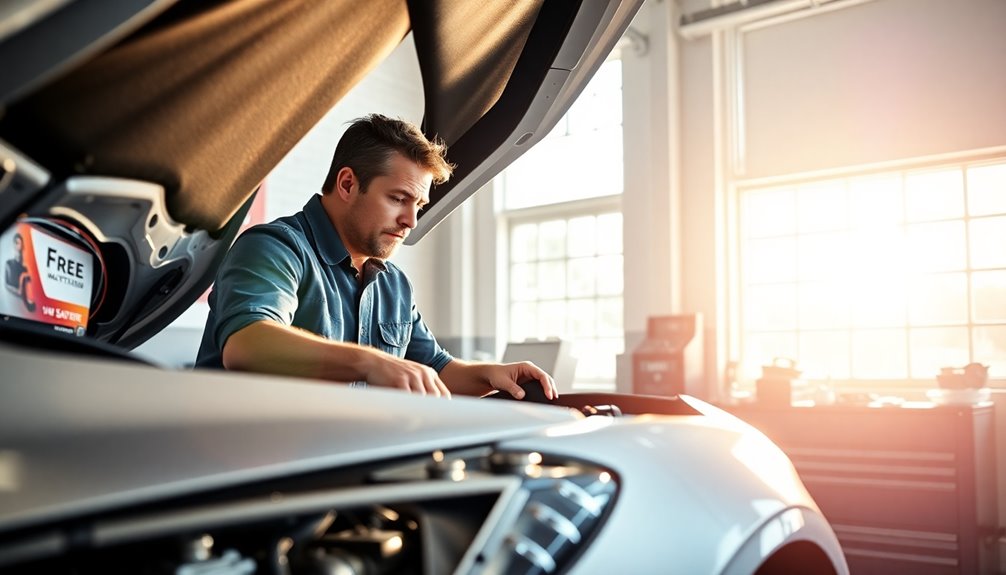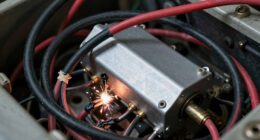Stop-start systems can shorten your battery’s life if you don’t maintain them properly or use low-quality batteries. These systems repeatedly turn your engine off and on, increasing strain on the battery and starter motor. Over time, this can lead to faster wear and potential electrical issues. Proper maintenance and high-quality components help prolong battery life. If you want to discover more ways to keep your system working smoothly, keep exploring these tips.
Key Takeaways
- Frequent engine restarts can accelerate battery wear, especially if the battery is aging or of low quality.
- Proper maintenance and high-quality batteries are essential to mitigate potential battery degradation caused by stop-start systems.
- System malfunctions or electrical issues may stem from increased load on the battery and starter motor.
- Regular checks and timely battery replacements help prevent premature failure due to increased cycling.
- Advanced stop-start technology with software updates aims to reduce negative impacts on battery lifespan.
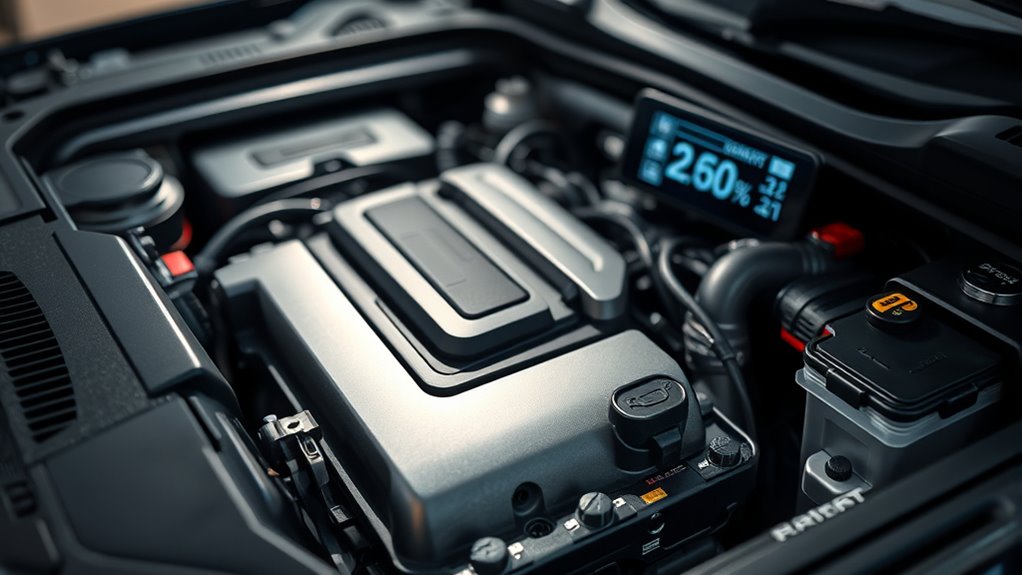
Stop-start systems are innovative features designed to improve fuel efficiency and reduce emissions by automatically shutting off your engine when the vehicle comes to a stop and restarting it when you press the accelerator. This technology is increasingly common in modern cars, especially hybrids and newer models, aiming to save fuel during city driving and reduce environmental impact. However, many drivers wonder if these systems might be causing more harm than good, particularly when it comes to their vehicle’s battery life.
One concern is battery drain. Since the stop-start system frequently turns your engine off and on, it demands a reliable and robust battery to handle these repeated cycles. If your car’s battery isn’t up to the task, you could notice issues like slow engine starts or electrical problems. This is especially true if your battery is older or already showing signs of wear, as the additional load from the system might accelerate its deterioration. Some drivers report that their batteries need replacement sooner than expected, leading to questions about the long-term effects of frequent stop-start operation.
Frequent stop-start use can drain your battery faster, especially if it’s older or worn.
System reliability also plays a critical role in whether these features are beneficial or problematic. When functioning correctly, stop-start systems are seamless, providing fuel savings without noticeable inconvenience. But if the system isn’t reliable—perhaps due to wiring issues, sensor malfunctions, or weak batteries—you might experience frequent interruptions, warning lights, or the system shutting down altogether. This can be frustrating and may even compromise safety if the system fails unexpectedly during critical moments. Manufacturers continuously update software and improve components to enhance reliability, but no system is infallible.
You should also consider the impact on your vehicle’s starter motor and related components. Because these parts are engaged more often, they may wear out faster if the system isn’t properly maintained or if the system is pushed beyond its limits. Regular maintenance and ensuring your battery and starter motor are in good condition can mitigate some of these concerns. Many automakers recommend using high-quality, compatible batteries designed for stop-start systems to improve longevity and system reliability. Additionally, understanding the importance of high-quality batteries can help prevent premature component failure and extend the lifespan of your vehicle’s electrical system.
Frequently Asked Questions
Do Stop-Start Systems Affect Overall Vehicle Maintenance Costs?
Stop-start systems can impact your vehicle’s maintenance costs by increasing wear on the battery, leading to more frequent battery replacements. They also require regular system diagnostics to guarantee proper function, which can add to maintenance expenses. While they improve fuel efficiency, you might find yourself spending more on battery care and diagnostics over time. Staying attentive to system health helps prevent unexpected repairs and keeps your vehicle running smoothly.
Are Certain Car Models More Prone to Battery Issues With Stop-Start Technology?
Think of your car’s battery like a delicate plant—you need to know the right environment. Some models are more prone to battery issues with stop-start technology due to model-specific issues and manufacturer variations. You’ll find that certain makes and models, especially those with older or less advanced batteries, face more trouble. Staying aware of your vehicle’s specifications and quality can help prevent premature battery wear and keep your car running smoothly.
How Can Drivers Extend Battery Life With Stop-Start Systems?
To extend your battery life with stop-start systems, you should regularly monitor your battery’s health and guarantee it’s in good condition. Maintain proper charging habits by avoiding frequent short trips and letting your engine run longer to recharge the battery fully. Also, consider checking your vehicle’s electrical system and replacing the battery if it shows signs of wear. These steps help keep your battery reliable and prevent premature failure.
Do Stop-Start Systems Impact the Lifespan of Other Electrical Components?
Wondering whether stop-start systems strain your vehicle’s electrical components? The answer is yes; they can cause additional electrical strain, which accelerates component wear over time. Repeatedly stopping and starting demands more from your alternator, starter, and wiring, potentially shortening their lifespan. To protect your vehicle, make certain regular maintenance and keep an eye on electrical performance, so you can enjoy the benefits without worrying about early component wear.
Are There Signs Indicating a Failing Battery Caused by Stop-Start Systems?
When your battery shows signs like slow engine starts or dimming headlights, it might be failing. Conducting battery diagnostics can confirm if your battery is weak, possibly due to increased alternator wear from stop-start systems. Keep an eye on these symptoms, as they indicate your battery might be struggling to keep up. Addressing issues early can prevent unexpected breakdowns and extend your battery’s lifespan.
Conclusion
So, while stop-start systems might seem to wear out your battery faster, modern batteries are built to handle this. If you keep up with regular maintenance and monitor your battery’s health, you shouldn’t see significant issues. Don’t let the fear of potential wear stop you from enjoying the fuel savings and reduced emissions these systems offer. With proper care, you can benefit from stop-start technology without sacrificing your battery’s longevity.

